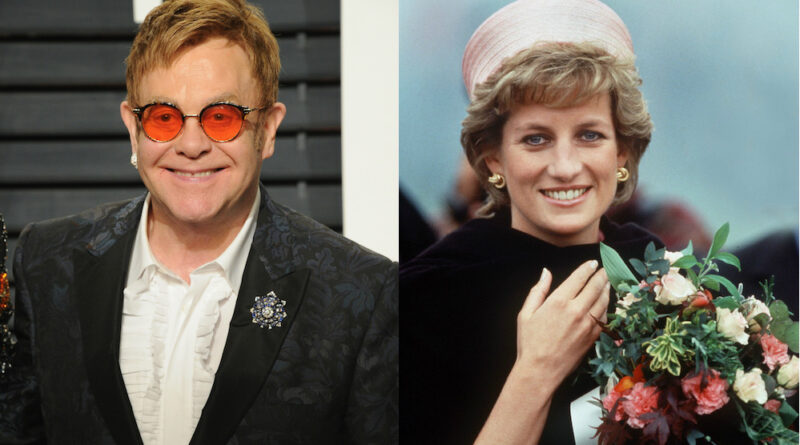How Elton John’s tribute to Princess Diana turned into one of the most heartbreaking farewells in history — remembered as “the day the music cried.”
London was motionless that morning — a stillness born only from grief. Bells rang across the city, echoing the sorrow of millions. Outside Kensington Palace, the pavements had transformed into a sea of mourning, piled high with flowers, handwritten notes, and flickering candles. Children clutched photographs, while men wept without shame. The death of Princess Diana had brought time to a standstill, as the world came together to say its final goodbye.
“A Different Kind of Farewell.”
Inside Westminster Abbey, a place that had hosted royal ceremonies for centuries, the atmosphere was unlike anything before. This was not about pageantry or tradition — it was intimate, raw, and profoundly human. Among the royals, dignitaries, and world leaders sat a man in a dark suit and sunglasses, hands clasped, his grief unmistakable: Elton John.
He was there not merely as a performer, but as a friend — a friend who had shared laughter, secrets, and late-night conversations with Diana. Both had endured the cruelty of the tabloids, both had carried the wounds of fame. In each other, they had found comfort. And now, he was preparing to say his final goodbye.
“Candle in the Wind” Reimagined
In the days leading up to the funeral, Elton was deeply shaken. He had only just attended Gianni Versace’s funeral when news of Diana’s death arrived. Still in shock, he missed her final phone call — a regret that weighed heavily on him. When his longtime lyricist Bernie Taupin suggested rewriting “Candle in the Wind” — a song originally written for Marilyn Monroe — the idea felt both overwhelming and necessary. Taupin’s new lyrics transformed it into a tribute to England’s “rose.”

There was hesitation at first. Some palace officials suggested replacing Elton’s performance with a hymn, worried it might stray too far from tradition. But the public’s voice was unmistakable: they wanted Diana remembered as she had lived — real, relatable, and deeply loved. Just hours before the service, Elton was told he could step back if the pain was too great. His reply was unwavering: he would sing.
A Moment That Stilled the World
When Elton walked to the piano, the Abbey fell silent. Cameras zoomed in as millions around the globe held their breath. The first chords rang out, and his voice — fragile, breaking at times — filled the cathedral:
“It seems to me you lived your life like a candle in the wind…”
It wasn’t flawless perfection, but something far greater: truth. Every line carried grief, love, and shared humanity. Queen Elizabeth bowed her head. Princes William and Harry, boys in suits too heavy for their young shoulders, listened quietly, their pain visible to all. The closing words lingered in the air:
“Your candle’s burned out long before your legend ever will.”
When the last note faded, there was no applause — only silence. A silence so profound, it became part of the song itself.
“The Aftermath of a Song”

Released as “Candle in the Wind 1997”, the recording became the best-selling physical single in history, with more than 33 million copies sold. Every penny of the proceeds went to Diana’s charities, turning grief into action. Yet Elton never performed that version again — it belonged solely to Diana.
For fans, the song was more than a global hit; it was a collective release of sorrow. Messages poured in:
- “I’ve never cried so hard at a performance.”
- “He sang not just for himself — he sang for all of us.”
- “Diana would have been proud.”
A Legacy Beyond Music
That performance remains one of the most unforgettable moments in music history — not for its spectacle, but for its humanity. It was one friend’s gift to another, a candle lit not in glory but in sorrow. In those few minutes, Elton John gave the world a way to grieve together, to find grace in loss, and to carry Diana’s memory forward.
Princess Diana was gone. But through Elton’s trembling voice, she was — and still is — remembered forever.
